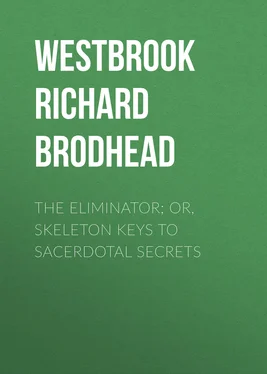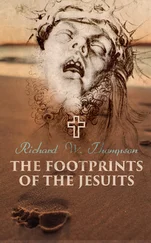Richard Westbrook - The Eliminator; or, Skeleton Keys to Sacerdotal Secrets
Здесь есть возможность читать онлайн «Richard Westbrook - The Eliminator; or, Skeleton Keys to Sacerdotal Secrets» — ознакомительный отрывок электронной книги совершенно бесплатно, а после прочтения отрывка купить полную версию. В некоторых случаях можно слушать аудио, скачать через торрент в формате fb2 и присутствует краткое содержание. Жанр: foreign_prose, foreign_religion, Философия, foreign_psychology, foreign_antique, на английском языке. Описание произведения, (предисловие) а так же отзывы посетителей доступны на портале библиотеки ЛибКат.
- Название:The Eliminator; or, Skeleton Keys to Sacerdotal Secrets
- Автор:
- Жанр:
- Год:неизвестен
- ISBN:нет данных
- Рейтинг книги:3 / 5. Голосов: 1
-
Избранное:Добавить в избранное
- Отзывы:
-
Ваша оценка:
- 60
- 1
- 2
- 3
- 4
- 5
The Eliminator; or, Skeleton Keys to Sacerdotal Secrets: краткое содержание, описание и аннотация
Предлагаем к чтению аннотацию, описание, краткое содержание или предисловие (зависит от того, что написал сам автор книги «The Eliminator; or, Skeleton Keys to Sacerdotal Secrets»). Если вы не нашли необходимую информацию о книге — напишите в комментариях, мы постараемся отыскать её.
The Eliminator; or, Skeleton Keys to Sacerdotal Secrets — читать онлайн ознакомительный отрывок
Ниже представлен текст книги, разбитый по страницам. Система сохранения места последней прочитанной страницы, позволяет с удобством читать онлайн бесплатно книгу «The Eliminator; or, Skeleton Keys to Sacerdotal Secrets», без необходимости каждый раз заново искать на чём Вы остановились. Поставьте закладку, и сможете в любой момент перейти на страницу, на которой закончили чтение.
Интервал:
Закладка:
That there is a general drifting away from the old formulas of religious doctrine everybody knows, and yet there is more practical religion in the world to-day than in any previous age. It does not consist in fastings and attendance upon ecclesiastical rites and ordinances; but it takes the form of universal education, of providing homes for friendless infancy and old age, of the prevention of cruelty to children and even to brute animals, of the more rational and humane treatment of lunatics, paupers, and criminals, ameliorating the miseries of prisons and hospitals,—in short, of elevating and improving the condition of universal humanity. These truly religious works do not depend upon any particular statement of religious belief, for all sects and persons of no sect are equally engaged in them.
Charities would not cease if all creeds should be abandoned or should be so revised as not to be recognized by the disciples of Calvin and Wesley, and if every priest in the land should henceforth give up the mummeries and puerilities of the Dark Ages.
Religion, as the “enthusiasm of humanity,” the cultivation of all the virtues, and the practice of the highest morality growing out of the inalienable rights of man in all the relations of life, is a fixed fact. It is a natural endowment, coeval with humanity in its development and progress, and is as absolutely indestructible as manhood itself.
So far from being true is the assumption that religion would be imperilled by the exposure of the false dogmas of theology and the heathenish rites and superstitious ceremonies of ecclesiasticism, it is clear to many minds that the myths of dogmatic theology and the absurdities of primitive ages are the chief obstacles in the way of the free course of true religion; and it may safely be affirmed that the distinguishing dogmas of the dominant theology, Catholic and Protestant, as will hereafter be shown, are essentially demoralizing and logically tend to undermine and corrupt public virtue. It is not intended to affirm that churches and theologians do no good and that their entire influence is bad. They teach much that is humane in principle and moral in practice, and so do good for society. Nevertheless, it is true that much of the rotten morality of the times can be philosophically traced to the influence of a false theology. The main dogmas of Romish and orthodox Protestant creeds are false, and it is absurd to suppose that a pure system of public virtue can be founded upon ignorance, superstition, and falsehood.
But, after all, we are asked, Does it make any odds what one believes if he is only sincere in his faith?
The obvious answer is, that the more sincerely you believe a lie the more dangerous is your faith. The more trustfully you build upon a sandy foundation the sooner and greater will be the fall and ruin of the superstructure. The more implicitly you confide in a dishonest partner or agent the more successful will be his robbery. There is no safety in error and falsehood. The Westminster divines well said, “Truth is in order to righteousness.” There can be no true righteousness inherent in a system of superstition and falsehood. The failure of the Church to reach the masses and to establish a condition of public honesty superior to the ancient heathen morality shows that there must be some serious defect in its methods.
But the crushing objection to theological agitation and free discussion is the common one that “it is unwise to unsettle and destroy the faith of the people in the dominant theology unless there is something better to offer them as a substitute.”
There is something better. Truth is always better and safer than falsehood. In the discussions which are to follow an attempt will be made to show that there is a natural religion which accords with enlightened reason, and which cannot fail to furnish a firm scientific foundation for the highest morality . The common saying, that “it is better to have a false religion than no religion,” contains two groundless assumptions—viz. that it is possible for a man to have no religion, and that that which is false may be dignified with the name religion . It is about time that things should be called by their right names, and that superstition and falsehood should not be deemed necessary to public morality.
For a religion (so called) of superstition and falsehood there must be a religion of natural science*that cannot be overthrown, and which cannot fail to make its way among men as knowledge shall increase and the principles of true religious philosophy shall be better understood. We should not be frightened at the cowardly cry of “destructive criticism.” We *must pull down before we can reconstruct.
CONCLUSIONS.
To imitate the example of the early Christian Fathers in fraud, falsehood, and forgery for the promotion of religion is a policy that is too shocking to the moral sense of civilized men everywhere to be tolerated. To withhold or suppress the truth is a crime against humanity and contrary to the spirit of this age; and those who do it are the enemies of progress and unworthy to be recognized as the authoritative teachers of the world.
Those who publish that which is false or suppress what is true not only do a great wrong to the people, but, if possible, do a greater wrong to their own souls, and must suffer the consequences. They must have an awful reckoning with eternal, retributive justice.
It is a most egregious mistake to suppose that the people cannot be trusted with the whole truth—that their sense of right is so dull and flimsy that on the slightest discovery of the errors in which they have been instructed from infancy they would lose confidence in all truth and rightfulness and rush riotously to ruin. If the people must be hoodwinked for ever, then the distinguishing principle of the Protestant Reformation and the basic principles of our American Declaration of Independence and republican government are false and delusive, and we should return to mediæval times and to feudal and autocratic government in Church and State.
It is high time that men should see that dogma is not religion; that blind faith is more to be feared than rational skepticism and scientific investigation; that whatever is opposed to reason and science in theology can be spared, not only without any loss, but greatly to the advantage of true religion and sound morality. All the religion that is worth having is natural and rational , and corresponds with the facts of the universe as they are demonstrated by the crucibles of science and the inductions of a sound philosophy. The principal moral obligations of men grow out of their relations to each other in life, and nothing can be more complete than the Golden Rule, emphasized in the Sermon on the Mount, but as clearly taught in the Jewish Babylonian Talmud , and in the twenty-fourth Maxim of the Chinese philosopher Confucius, and many others centuries before the Christian era.
Instead of loading down religion with Oriental myths and fables, instead of a gorgeous ritualism and surpliced priests, borrowed literally from the ancient paganism, instead of dogmas and creeds and unquestioning faith and blind submission to ecclesiastical dictation and rule, we want sound moral instruction in the great fundamental truths of nature and of science, which will always be found to strengthen and confirm the principles of true religion. These are the sources from which to gain light. We want less creed and more ethical culture, less profession and paraphernalia in religious worship and more practical philosophy and common sense.
The man who in scientific matters would make false representations and conceal the real truth would be deemed an impostor, and the time has come when hypocrites and cowards in theology should be made to feel their degradation and be forced into an open abandonment of “ways that are dark and tricks that are vain.” If we would scorn delusions in natural philosophy, if we would correct errors in oceanic charts, astronomical diagrams, and geographical maps, why should we hesitate to correct the most egregious blunders regarding those things which are infinitely more important? Can we with any proper sense of propriety and right connive at falsehood and uphold and strengthen it by our silence and cowardly negligence in failing to expose it? Are not all delusions debasing and opposed to the progress of truth and the elevation of mankind? In all the departments of human knowledge religion and morality are most imperative in their demands for pure and unadulterated truth; and he who does not recognize this fact sins grievously against his own soul, against the human family, and against the truth and its eternal Author, the God of all truth.
Читать дальшеИнтервал:
Закладка:
Похожие книги на «The Eliminator; or, Skeleton Keys to Sacerdotal Secrets»
Представляем Вашему вниманию похожие книги на «The Eliminator; or, Skeleton Keys to Sacerdotal Secrets» списком для выбора. Мы отобрали схожую по названию и смыслу литературу в надежде предоставить читателям больше вариантов отыскать новые, интересные, ещё непрочитанные произведения.
Обсуждение, отзывы о книге «The Eliminator; or, Skeleton Keys to Sacerdotal Secrets» и просто собственные мнения читателей. Оставьте ваши комментарии, напишите, что Вы думаете о произведении, его смысле или главных героях. Укажите что конкретно понравилось, а что нет, и почему Вы так считаете.












